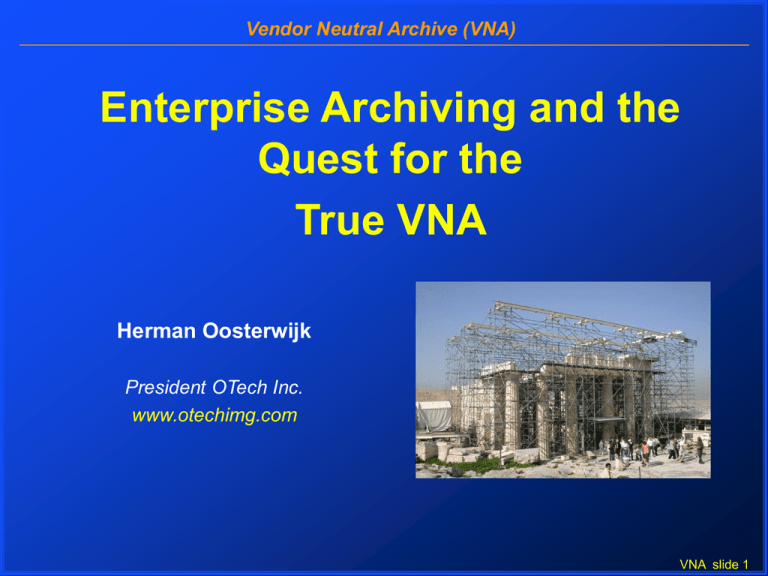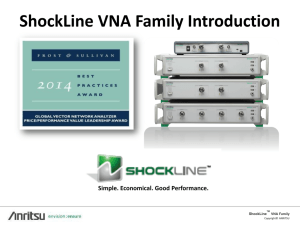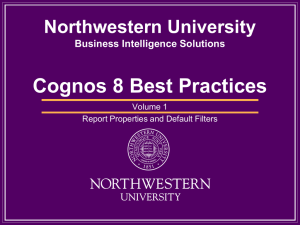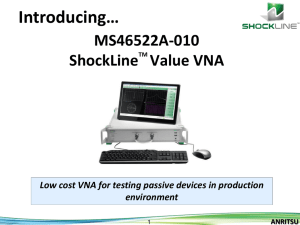
Vendor Neutral Archive (VNA)
Enterprise Archiving and the
Quest for the
True VNA
Herman Oosterwijk
President OTech Inc.
www.otechimg.com
VNA slide 1
Vendor Neutral Archive (VNA)
Agenda:
Definition of a VNA
Different VNA levels to understand the “VNAconfusion”
Conclusion and recommendation
All rights reserved OTech Media Inc.
VNA slide 2
Vendor Neutral Archive (VNA)
VNA definition:
A Vendor Neutral Archive (VNA) is a medical device
that provides scalable image and information and life
cycle management so that images and related
information can be queried, stored, and retrieved in a
manner that is defined by open standards at multiple
department, enterprise, and regional level while
maintaining patient privacy and security.
Characteristic for a VNA is that it provides a patientcentric approach that transcends upgrades and
changes of the different viewing, acquisition, and
workflow management components as they should be
interchangeable without having to migrate, convert, or
change the data formats or interface of the VNA.
All rights reserved OTech Media Inc.
VNA slide 3
Vendor Neutral Archive (VNA)
Different levels of VNA:
1. Traditional DICOM archive: serves typically
only one department such as radiology
and/or specialty such as ultrasound, digital
mammography, nuclear medicine, or
radiation therapy. All information is stored in
the DICOM format, even SC, PDF, Waveforms.
Studies being scheduled by a single
scheduling system issuing a unique Patient
Identifier and orders are identified by a
unique Accession Number.
All rights reserved OTech Media Inc.
VNA slide 4
Vendor Neutral Archive (VNA)
Different levels of VNA:
2. Multi-departmental archive, which typically
can serve multiple imaging departments
and/or specialties, such as cardiology and
dentistry. Can manage some limited nonDICOM information such as physiological data
and EKG’s for cardiology, JPEG’s for
dentistry, ophthalmology, or endoscopy.
Patients could have multiple Patient ID’s
and/or scheduled by multiple schedulers
resulting in multiple,
non-unique
Accession Numbers.
All rights reserved OTech Media Inc.
VNA slide 5
Vendor Neutral Archive (VNA)
Different levels of VNA:
3. Multimedia archive, which expands the capability of
objects to be archived, such as MPEG’s for
endoscopy and speech pathology, as well as a wide
variety of text documents (PDF, Word, etc.). This is
the level where digital pathology slides are
managed.
4. Enterprise archive, which serves as the backbone
for multiple institutions, hospitals, and/or regions. A
fully functional Master Patient Index (MPI) is needed
to reconcile patients.
All rights reserved OTech Media Inc.
VNA slide 6
Vendor Neutral Archive (VNA)
Different levels of VNA:
5. A “true” VNA, which provides a patient-centered,
open architecture that allows for managing the
images. Related information can be exchanged
using XDS protocols and patient demographics be
reconciled using PIX/PDQ protocols.
All rights reserved OTech Media Inc.
VNA slide 7
Vendor Neutral Archive (VNA)
Conclusion:
There are many levels of “VNA” offered by vendors
It is critical to identify your current level, identify the
gaps, and define a transition plan to a true VNA
Use detailed checklists and requirements when
writing a RFI or RFP
Not meeting VNA criteria will create future migration
costs and potentially lacking Meaningful Use
requirements when implementing an Electronic
Health Record
Finally: your picture of a VNA migth be
very disceiving
All rights reserved OTech Media Inc.
VNA slide 8
Vendor Neutral Archive (VNA)
Resources:
VNA white paper
VNA RFI/RFP checklist
Questions/comments:
herman@otechimg.com
The VNA race is on, don’t loose out this time
around!
Discussion questions:
How does “Cloud” relate to a VNA?
Is it time for an “archive” standard (e.g. by
IHE)?
Does Meaningful Use apply to the VNA?
All rights reserved OTech Media Inc.
VNA slide 9









